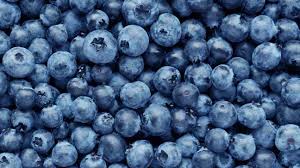 Blueberries are one of the healthiest fruits.
Blueberries are one of the healthiest fruits.
Blueberries are a widely distributed and widespread group of perennial flowering plants with blue or purple berries.
They help protect against aging, cancer and damage to DNA..
A standard serving of 100 grams (3/4 of a cup) provides 65 calories and 15 grams of carbohydrates.
Rich in antioxidants.
Antioxidants are key to reducing the impact of oxidative stress.
Antioxidants create a barrier or a shield around the cell to help protect it from being damaged.
Blueberries are very high in antioxidants, specifically anthocyanins, which are also found in chokeberries and elderberries.
A cup of cultivated blueberries has 9,019 antioxidants, and Lowbush, or wild, blueberries have 13,427 total antioxidants per cup.
Full of vitamins and minerals.
Blueberries have several health benefits as they are loaded with antioxidants, vitamins, fiber, and other beneficial nutrients.
Bueberries can help reduce LDL cholesterol levels, lower blood pressure, and reduce the risk of cardiovascular diseases.
Blueberries contain high levels of flavonoids, which have been shown to improve cognitive function in older adults and also delay or prevent age-related cognitive decline.
Blueberries are rich in anti-inflammatory compounds and thus can help lower the inflammation in the body, which is linked to many chronic diseases such as cancer and diabetes.
The fiber present in blueberries can aid in digestion and promote the growth of healthy gut bacteria, which is essential for many aspects of health.
Blueberries contain vitamin C, which is a nutrient that supports the immune system to defend against various illnesses.
Blueberries are nutrient-dense.
They’re good sources of vitamin C and vitamin K, as well as manganese.
A cup of blueberries provides the following recommended daily intake of vitamins and minerals:
Vitamin C: 24%.
Vitamin K: 36%.
Manganese: 25%.
Dietary fiber: 14%.
Blueberries are high in soluble fiber.
Soluble fiber binds around the bile in our guts and helps remove that bile.
Soluble fiber binds around the bile, it helps to remove that bile, composed of cholesterol with the body’s waste, therefore can lead to a reduction in cholesterol.
Blueberries are high in fiber and lower in sugar compared to other fruits, and don’t cause blood sugar to spike.
In a study of men living with Type 2 diabetes found that eating blueberries daily lowered certain cardiometabolic health parameters, such as triglycerides.
Potentially reduces blood pressure:
Eating blueberries helps reduce blood pressure in people who have metabolic syndrome because it helps the body produce more nitric oxide, which relaxes your blood vessels.
Most benefits come from fresh, uncooked organic berries.
Heat can affect the antioxidant content.
Blueberries are a versatile fruit suitable for meals at any time.
Blueberries are usually prostrate shrubs that can vary in size from 10 centimeters (4 inches) to 4 meters (13 feet) in height.
Wild blueberries reproduce by cross pollination, with each seed producing a plant with a different genetic composition, causing within the same species differences in growth, productivity, color, leaf characteristics, disease resistance, flavor, and other fruit characteristics.
The mother plant develops underground stems called rhizomes, allowing the plant to form a network of rhizomes creating a large patch which is genetically distinct.
The fruit is a berry 5–16 mm (3⁄16–5⁄8 in) in diameter.
They are pale greenish at first, then reddish-purple, and finally uniformly blue when ripe.
They are covered in a protective coating of powdery epicuticular wax (bloom).
Nutritional value per 100 g (3.5 oz)
Energy 240 kJ (57 kcal)
Carbohydrates
14.49 g
Sugars
9.96 g
Dietary fiber
2.4 g
Fat
0.33 g
Protein
0.74 g
Vitamins
beta-Carotene
lutein zeaxanthin
0%32 μg
80 μg
Vitamin A
54 IU
Thiamine (B1)
3% 0.037 mg
Riboflavin (B2)
3% 0.041 mg
Niacin (B3)
3% 0.418 mg
Pantothenic acid (B5)
2% 0.124 mg
Vitamin B6
4% 0.052 mg
Folate (B9)
2% 6 μg
Vitamin C
12% 9.7 mg
Vitamin E
4% 0.57 mg
Vitamin K
18% 19.3 μg
Minerals
Calcium
1% 6 mg
Iron
2% 0.28 mg
Magnesium
2% 6 mg
Manganese
16% 0.336 mg
Phosphorus
2% 12 mg
Potassium
2% 77 mg
Sodium
0% 1 mg
Zinc
2% 0.165 mg
Water
84 g
Blueberries sold:fresh or are processed as individually quick frozen (IQF) fruit, purée, juice, or dried or infused berries.
These may then be used in a variety of consumer goods, such as jellies, jams, pies, muffins, snack foods, pancakes, or as an additive to breakfast cereals.
Blueberry jam is made from blueberries, sugar, water, and fruit pectin.
Blueberries consist of 14% carbohydrates, 0.7% protein, 0.3% fat and 84% water.
They contain only negligible amounts of micronutrients.
Contain moderate levels of the essential dietary mineral manganese, vitamin C, vitamin K and dietary fiber.
A 100-gram serving provides a relatively low caloric value of 57 kcal with a glycemic load of 6.
Blueberries contain anthocyanins, other polyphenols and various phytochemicals.
Anthocyanins, are blue pigments in blueberries.
Blueberries need highly acidic soil, do not self-pollinate.
